What if you started a print shop with your best friends – and printed for your favorite bands, companies, and celebs?
That’s what Upstate Merch has made a reality. Join owner Dylan Gilligan as he shares the story of a tight-knit shop in rural New York. “All of my core people are people I have known since I was 12 years old.”
With two podcasts – the Upstate podcast and Shirt Show – Dylan spends a lot of time talking shop. “Why don’t we just let people listen to these great conversations so they can gain some nugget of knowledge,” Dylan explains. Check out Shirt Show here.
Upstate’s focus on detailed art, intricate separations and customers that they’re interested in has kept them busy despite the pandemic. Dylan doesn’t hesitate to downplay his own skill and determination: “I’m not some business mastermind that thought of ways to do all of this.”
From finding a great deal on a building and renovating it to hiring and firing friends, this episode covers ground every print shop owner and employee can relate to – and shows what happens when you combine your passion with a little bit of luck.
The secret to Upstate’s success in working with such ideal customers?
“The truth? If you want to get into a certain market, find 3 people in that space that have really good art (or help them get really good art). Then all you have to do is take those designs, make a portfolio, and show the people you like and want to work with the things you did.”
Check out Upstate Merch on the web: https://www.instagram.com/upstatemerch/
This transcript has been edited for brevity and clarity.
Dylan: You psychos do podcasts first thing in the morning.
Bruce and Steven: Wow, ok! So are you in the shop?
Yeah, I’m in the shop. For years and years we’ve had one office space with me and the other sales guys. I own the whole building, so we decided to renovate the center section. It was an antique store for years, rented to an old couple. We renovated it when they left.
I’m actually going to have my own office. If you were in the space with the guys, you’d hear obscenities and things no podcast listener should hear. So there’s no heat on this side of the building…they’re literally putting the heaters in today.
I’m in New York, so it’s 25 degrees at night.
You could put a little Buddy dryer by your desk. I think most shops are heated by their dryer.
I don’t know how we met, Dylan. Internet friends? If we were to meet at a tradeshow, give us your 30 second rundown of Upstate Merch.
Well obviously, if you don’t know who I am then you’re missing out!
I’m Dylan Gilligan. We started Upstate in 2009 in a two-car garage, purchased the building we’re in now. I was in a band before. Classic screen printer story. I was the guy in the band that booked the shows and helped promote the band and do the merch.
Back then, being in a hardcore band, you took whatever shows were coming. I didn’t have to book them really. Every weekend there was a place to play. That spiraled into printing our own merch out of my Grandfather’s sign shop. I went there and printed shirts and knew nothing about screen printing. Just went to Walmart and bought blanks. All white ink. Probably not cured all the way. And then just sold them at shows.
We were that band that had everything. Sweatpants, and tees, and hoodies. Then the kids would buy everything. So we would go back the next day and say – hey, let’s do the same thing but in blue ink. And the kids would buy everything again, even if it was the same, because it was in blue ink and not white! It was funny because we made a lot of money with merch and we realized it was a big thing. But I didn’t want to be a screen printer.
Long story short, I started a company called Merch Buttons. I made 1” buttons with a manual press in my house and started a website. This was when MySpace started. When we did the band, it was forums and message boards…MySpace was huge. You could wild-west message everybody asking for business. I did that for a long time.
Then a buddy of mine, Ben Landy, a big designer [Hot Topic, etc] told me to think about selling t-shirts and stickers. I didn’t know anything about it. And he linked me up with Terminus – Jon Ladd in Georgia – and I was introduced to Jon.
Then I started outsourcing my shirts to Jon. I got to the point where I was sending them a ton of work. Jon was like…hey, what if I buy your button company and move you to Georgia and you work with me in the office? I had nothing else going on so I was like hey, let’s do it.
He bought the company.
How did that work?
It was really weird. I am not a super business-y guy. It was more circumstances: I can do this and make money. I never thought about it. I was doing buttons to do buttons, to make some side cash – I was working at Sears installing appliances!
I did buttons at night and on weekends. So Jon took the company and moved me down there. I literally got married and the next day got in a moving truck and drove down to Atlanta. Our honeymoon was driving to Georgia.
I worked at Terminus doing sales for about 2 years. It was good. I learned a lot. It was a similar setup to what I have here – me and Jon were in the same room. I knew how to do sales, and I just hit the ground running. Hit up whoever I could and talk to lots of people. We built up Terminus really well and they got a new building.
I came to terms with the fact I didn’t love Georgia. Where I’m from is super rural. We are in the trees. Everyone knows who you are. It was culture shock. Georgia was cool, but it was not for me, and I could not see myself there forever. I told Jon I wanted to move back to New York – he didn’t love the idea. So I left there with a lot of knowledge about printing and the entire industry.
I came back to New York and started over with my own print company. He didn’t like that. He’s a competitive guy.
We love Jon. He’s great. That $399 tee deal is legendary.
I had a part in that.
So it’s your fault!
So you helped really grow Terminus. What was the process like to grow sales?
The hustle. Just messaging people. I would never cold call people. I would use email or meet people at shows or at events. I would just talk to them like a normal person.
That’s been the way I’ve done this company the whole time: shooting the shit with people. Then show them something we printed. Usually they’ll like the way something looks, and you can start a good conversation.
There were never sales tactics.
What were the emails like, though?
Depends on who we tried to get. Then, it was a lot of bands. Jon and I knew the band market. “Hey, I was in this band” or “Hey, love your new album,” then you ask – who prints your merch? Then we say, hey. We can print your merch. Here’s the pricing. We can ship it straight to your venues.
That’s the conversation flow and how we’ve really always done it.
We see so many questions about sales. So it’s really interesting. Tossing a complement in the area you know well –
That’s the single biggest thing people don’t get.
They’re looking at it like: I’m a screen printer. I can screen print for anyone and everyone. Anyone that needs merch, I will print for them! And they don’t focus on one thing. Or even ten things!
For me, I like motorcycles, bands, and Sasquatch. So I can focus entirely on that niche market. There are ton of motorcycle groups, clubs, clothing lines – and I already know the lingo to talk to those people. “I have three Harleys, I like riding here…”
You’re legitimate right away.
Exactly. It’s not a sales pitch. It’s hey…let’s start a conversation.
So that’s what we do all the time. What are we into right now? Let’s talk to those people. Our thing with Upstate here is that most of our clients are people we can relate to – not a random business.
We get business from other people, of course. But our core group, our “80/20” is stuff that we’re really into.
So is it safe to say that you’ve engulfed yourself in your hobbies and what you’re passionate about? Does it still resonate from your vision, since you have a team there?
I feel like it’s a little of both. I do some sales stuff. But everyone here has the same core values. It’s our culture here.
That’s what is funny. People comment on our structure. The core employees have been with me for the entire 10 years. All of my core people are people I was in the band with and have known since I was 12 years old.
Wow. There is probably loyalty since you’ve been through so much together. When you have culture, you just don’t have so many problems.
This is a catch-22 thing. Everyone that’s here knows everything.
I don’t keep the business secret. We all talk about it. I am not the smartest person here just because I am the business owner. If I have something I’m going to do, we all talk. We get each others’ thoughts.
When we bought the CTS, I went to Brian who has to do separations all day. It’s not just my decision. It’s like: what do you think? Should we go this route? We all lean on each other.
We have days when it’s really nice out and I’m like – how about we all go on a motorcycle ride to Syracuse and get BBQ? They’ll be like: no, I don’t think we should do that. We have some jobs due in a few days. I’m like…I am the owner. I’m saying let’s go on a ride and get BBQ. And they’re like – no, we have shit to do.
They want everything out on time and as good as it can be. I’m the kid with a stick poking them being like – come on, let’s go play!
That’s amazing. Have you ever had to let go of a friend?
Hah, yeah. A guy I knew from high school.
He didn’t work here for the first few years. He hit me up and was looking for a job. I hired him because I trusted him and knew him.
His personality didn’t mesh – he got along with me and my friends. But he was the toxic guy in the shop that brought everybody down. He would be very critical of what everyone else was doing. If a new guy started job, he’d slide the shirt over to his side of the dryer and inspect it beyond reason.
Certain days you could tell he was in a bad mood. So we would all be on eggshells all day. We didn’t want to piss him off. It would become a worse day. So eventually I had to let him go, and as soon as he left it was way better.
That’s my fear with hiring a friend, too. I don’t want to cause problems outside of work in our personal lives. Were there problems afterward?
I haven’t spoken to him since. He was a good friend. That’s the thing.
Look, the core guys here: we hang out every day. We do things together on nights and weekends. This business, for me, isn’t a money-making machine. I literally try to grow the business so I can have fun during the day. Right now, with the renovations, half of the room we put together is going to be for gaming on the weekends. TVs, Xboxes, a big couch. So we can just hang out and play games and watch movies.
We’re all dedicated to this because we love it and it fuels the rest of our lives. We make money to do fun stuff and then come back to do it all over again. That’s the culture here.
We spend more time with employees than spouses or friends, you know. 40 hours a week is a lot of time. Letting go of that toxic person is hard but it’s like a breath of fresh air.
He was here for 7 years. Those first 5 years, there were hints of it. Then it would be on and off. I literally fired him at one point, we got really busy again, and my friends were like…give him a second chance!
He was a good printer. That’s the hard part. He was dedicated to working. He was just an asshole. When it gets busy you stop thinking about that. You think…hey, we could get more jobs out. It was like going into a bad relationship again, drunk texting late at night…
When times get tough, say when the pandemic hit, how did the conversations change?
I’m in a different situation. We got very fortunate with the way we set the company up that we didn’t have to worry about it too much. In the beginning you do stupid stuff with money that you shouldn’t do. There were times in the winter we couldn’t afford payroll. That can’t happen.
We all know what’s going. We buckled down and were committed to it. It just works out. We saw what was happening. With COVID, we had paid for all of our equipment. No leases. We own the building, and it’s paid for. So realistically, we could just close the doors and come in and work and not really have to deal with COVID too much because of being super rural.
We applied to be essential since we do so much for construction and hospitals. So we just stayed open. Everybody who works here…we come in and work and go home. We’re not clubbing. We’re not worried about spreading it. We’re in our routine.
Who taught you to buy everything outright? This is a big debate in the industry: leasing versus buying. Why do that?
I didn’t grow up with money. So it was kind of like: you buy things when you have the money. If you do everything on credit or lease it…you just don’t know what is going to happen. Even if you buy shoes and clothes…what happens if you don’t have the money to pay for that stuff?
I have just been that way. As soon as I owe anybody anything, I get stressed out. I don’t like that they have that over me and that I’m beholden to them and mooching off them. I just want it to be gone and have zero stress. Same with equipment.
Was that the thought for the building, too? Some shops don’t want to buy a space. Others do. How did you do that?
The building is a crazy situation. I never wanted to buy a building. I’m not some business mastermind that thought of ways to do all of this. Now, it makes a lot of sense. But at the time, it was an accident. I’m not thinking 20 years in to the future about my money.
I just rolled into it like a dumbass!
In our two-car garage, we were literally counting shirts in the grass. We didn’t have any room at all. Sawhorses and plywood tables on the lawn. I came into our small town and was looking for bigger space to rent. So there’s this old train station.
Everyone knows everyone here. There’s about 1,500 people. I walk in and start talking to the guy in the building. It’s a hunting and fishing shop and the shop was an archery range. He’s old and trying to retire. I asked if he wanted to rent the big space.
He didn’t want to take on a renter. He wanted to talk in about a week. I went and talked to the local real estate agent, and he’s like: they’re trying to sell that building. I didn’t have any money. I had $500 in my bank account. I can’t afford it. The real estate agent told me: look, he can’t sell it through a bank. The building is directly next to a train station. Over years and years, the station was used to store all kinds of things that are transported by train. They just dumped it from the trains into these big tanks.
When they did that, it polluted the soil. So it won’t pass some kind of environmental survey that a bank requires. He talked to the guy that owns the building, told him to lower his expectations. So I came in here again, and the man brings up buying the building. He told us he’d sell it for about $60,000.
It’s almost 10,000 square feet. It’s a long building. It’s old. It needed a lot of work. It had some heat and electric, just what we needed to get going. I couldn’t pass up this deal. So I got my parents to loan me $10,000 to pay for a down payment. The funny thing is: this was all handshake. There was no bank. It was just, hey, I’ll pay you $500 a month for 10 years.
That’s what we did.
The first year, we had two manuals and a tiny dryer in the middle. Every year we added more stuff. It was just simple. We would do X amount of jobs, take the profit, and invest a little into the building’s plumbing or electric. So now this building is totally remodeled. It looks like an old train station on the outside, but on the inside it’s brand new.
Do you think you’ll ever outgrow that building?
I stumbled into this. The niche market we’re in, and the way our shop is…I want to stay where we’re at with our presses and employees. I just never want to be slow. I want to have the business we want to have and be able to turn stuff down.
That’s my goal. I want to turn stuff down. We got the new Gauntlet III and it’s a little tight…so we might add 40’ to the building for shipping and receiving.
Shipping and receiving is tight. There are boxes everywhere. That’s a challenge, and we need more space for it. But production, the flow, the office…it’s good. We’re good here. If we need to get bigger, I’ll just buy the building across the street or buy some land and build a small building.
I don’t want to do that. But if I had to, that’s how I’d do it.
The rent vs. buy situation is tough. It depends on where you are and your market. I had this talk with Shirt Agency in LA. He pays $10k a month for the space. It’s just gone. It did nothing for you. I can’t imagine that, it seems crazy to me. But that’s his market. That’s the cost of doing business in LA. But for me? I barely do local business. I could be on a mountain somewhere because everything is on the US and the internet and Canada and the UK…we ship anywhere if they pay the freight.
I can’t go to everybody and say they should buy their own building. I can’t imagine what it costs to buy a building in LA.
Family Industries in LA literally had to build up. They could only do so much. But they said you really have to hunt down deals in commercial real estate. You have to know your town and scope things out a bit.
This is terrible to say. There are always people going out of business. There are always companies having a hard time that are ready to quit.
Even screen printers do this with equipment. You get the biggest best equipment instead of what you can afford and going slowly. You’ll get there, but earn it and take the time to get it.
In my mind, I could have thought about one kind of business. I could have had this end in mind. But I would have spent $300k on a commercial space. You just need to get what works and then eventually upgrade it to where you want it to be. You don’t need to spend more money than what you have.
You do a lot of content and podcasts. What’s the thought behind Shirt Show?
It’s just for fun. My hobby…our crew all has their own hobbies. They’re into music or art or video. My hobby is screen printing and this shop. When I’m home and bored, I come back here to hang out and do shit.
I remember starting on MySpace and AIM. Long before the social networks. Instagram is just a place for me to talk to my friends. The podcast started because I’d be talking to printers all day on DMs, and we’d get into a good conversation about inks or the way we do things or just shooting the shit.
It started because it was like, why don’t we just let people listen to this conversation so they can gain some nugget of knowledge from that conversation. So I started the Upstate podcast and would just chat. Then me and Andy (from SHIRT KONG) got close. We called each other once a week and chatted. We were like, hey, let’s do another show where we can chat together.
We’re kind of polar opposites. I’m digging and a [jerk]. And he’s “Soft Handy.” We disagree and then we yell at each other. It’s all in good fun. It’s just giving each other shit. I like doing it. It’s fun. I like talking about printing, learning new things, doing complicated prints just for the fun of.
I’d rather do complicated prints all day long than do ten 10,000 orders a week.
I love just hearing different perspectives and learning about the day to day problems. How about marketing for your shop. What’s that like?
We’re very close to that goal right because we’re pretty busy a lot of the time. With this renovation, I’m going to add one or two more customer service people. Day to day I walk in to a couple hundred emails. I hired somebody to help me with those emails. Chris in the office had the same thing. So we’re adding somebody every time we get to a point where our inbox is too high.
My goal is customer service. I want customers to be answered quickly. Customers come to us and are like I want 100 shirts. We’ll coach them if they’re trying to do a clothing line. Hey, don’t use that Gildan – use a Bella + Canvas option. Don’t just slap plastisol on it. I’d rather give the customer more knowledge than they thought they needed. I want them to feel like I got them where they wanted to go.
A lot of people go on YouTube, watch 3 videos, then go – I’m going to start a clothing line!
The truth is that if you want to get into a certain market, find 3 people in that space that have really good art (or help them get really good art) and then all you have to do is take those designs and make a portfolio and show them the things you do for so-and-so. They’ll go: oh, that’s cool! I’ll do that too.
So that’s been the snowball the whole time. We’ve been going out instead of waiting for people to find us.
My first thing in the email is delegating emails off to people. I look at stuff and think about whether it’s a huge customer that I should take the time out of my day to baby. It’s like playing a video game and getting to the next level: wow, we’re working with this person?
Do you use video calling or just email to help customers?
It’s mostly all email. The biggest thing customer want is to see and feel blanks and samples. We’re not local. So what I’ll do is say: what items are you looking for? If they want a nice long sleeve and a hoodie, I show them the Bella long sleeve – then I’ll call my S&S rep and tell them to send that customer samples. Then I’ll email mockups. If they want a printed sample, I’ll overnight or second day it to them.
The speed is crucial. They’re always impressed by the speed.
Shops are concerned about how much they’re spending in samples. But when customers get that bag the next day, they’re amazed.
We don’t spend much on advertising or marketing. But this technique is our marketing. There are people that spend thousands on a billboard. But how many samples can you send with a couple thousand dollars to great customers you should go after?
S&S or Alpha typically doesn’t even charge us for these samples. They know we’re not trying to rip them off. I’ll tell them who it is. They know the volume we do. If they like it, they’re going to order a lot of it. Down the line, we could get quite a return on a small $10 investment – and it’s mutual with the wholesaler.
What does your day-to-day look like and what do you want it to be?
We start at 9. I get here at 8:30, drink iced tea and watch YouTube videos to get the day started. I almost always start off with some kind of print video.
I love movies. I’ll watch trailers. So I do that in the morning, then I go through my email. I delegate it and forward it out. Then I just reply to emails and put out fires at work.
Someone grabs me on press. We need to figure something out. There’s a shipment being dropped off. I have so much stuff to do that’s not customer-related. It’s running the business. My goal is to get those other two customer service people to handle almost all of my emails. I really want to focus on going after the big fish that I want to get for customers.
We’re comfortable, but there’s companies I really want to work with. I do that “dream 100” thing. I make a list of people I look up to, companies I want to work with, and I’ll start a conversation. I like their posts, comment on them. Then I put together a promo box when the time arises. When they post a design, or they post marketing stuff…I’ll send that promo box with tees, some things they’ll like, a handwritten note, then I’ll just mail it to them.
It’s that sample effect. They think it’s awesome, feel like you’ve really spent time and energy…and want to have a conversation.
If you want to know how we got cool customers, we just had a conversation with them as a real person.
No one wants the ten paragraph email that you delete instantly.
If somebody that owns a company hits me up and starts a real conversation about something we just did, then it’s awesome.
The person behind the Instagram is probably a business owner, or someone in marketing, or someone creative. You don’t have to worry about the sale so much as the relationship.
To me, getting all of the info to prepare the job is boring. But making the screens and prepping the job to be on press is amazing. When it’s on press and the inks are in the screen, it’s a huge rush.
The biggest rush is that I know the customer is going to be stoked. We talked about it and figured out the shirt it should be on together. That customer, when they open that box, is going to be like: Dylan came through. They helped me out with this. So that’s the rush for me.
Half of sales is like, they just have to like you. The other half is that you’re adding value.
We’re not trying to create a culture here. There’s part of the culture here that I can’t show people, because we’re just such buttheads to each other. We’re such a silly non-PC shop.
The other day Nate showed up in $1,500 Batman costume for Halloween. And I made him print in that. Like, we’re not making YouTube videos for marketing. We’re doing it for fun!
What’s next for Upstate?
Heat in this room. Hah!
We’re going to finish this office space, get other people in here to help me out customer-service wise, then go after the dream jobs that I want to do.
Celebrities and famous people are real people. You have to find a commonality and connect. There is no reason they can’t work with you.
We really appreciate you joining us, Dylan. Thanks so much for sitting in that thirty degree room for us for an hour. When you come to Chicago, come see us in our little studio.
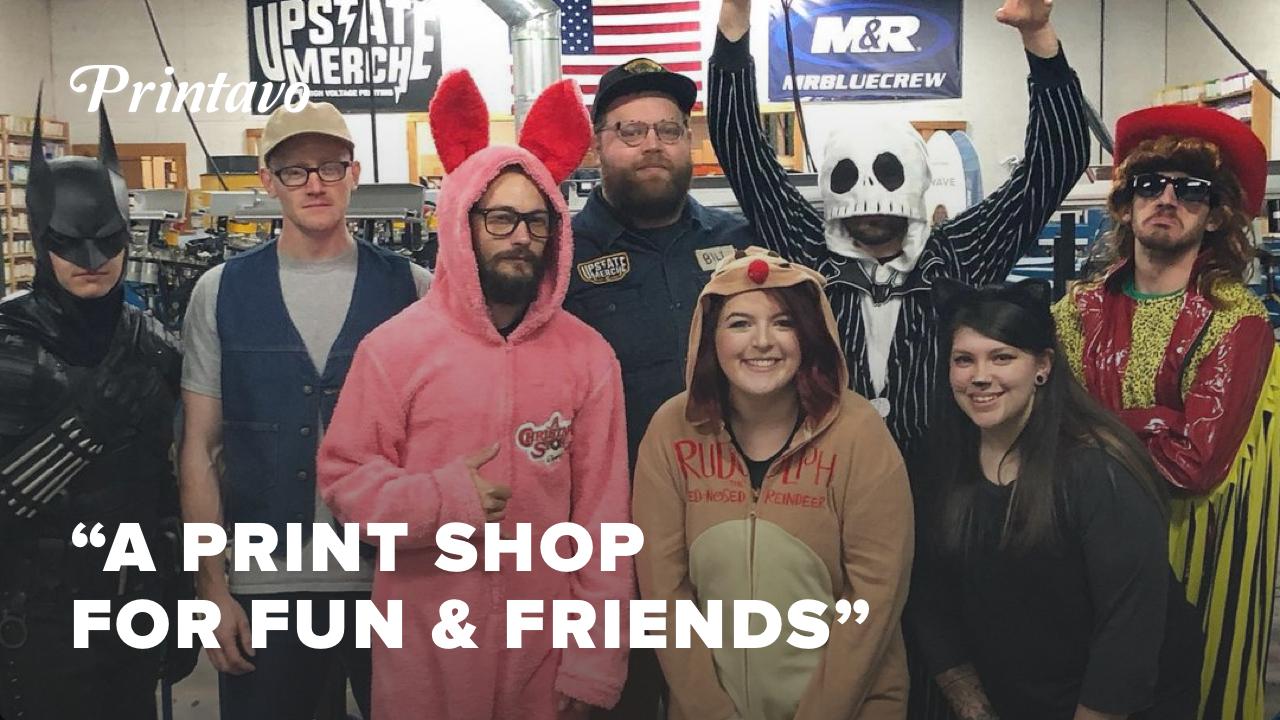
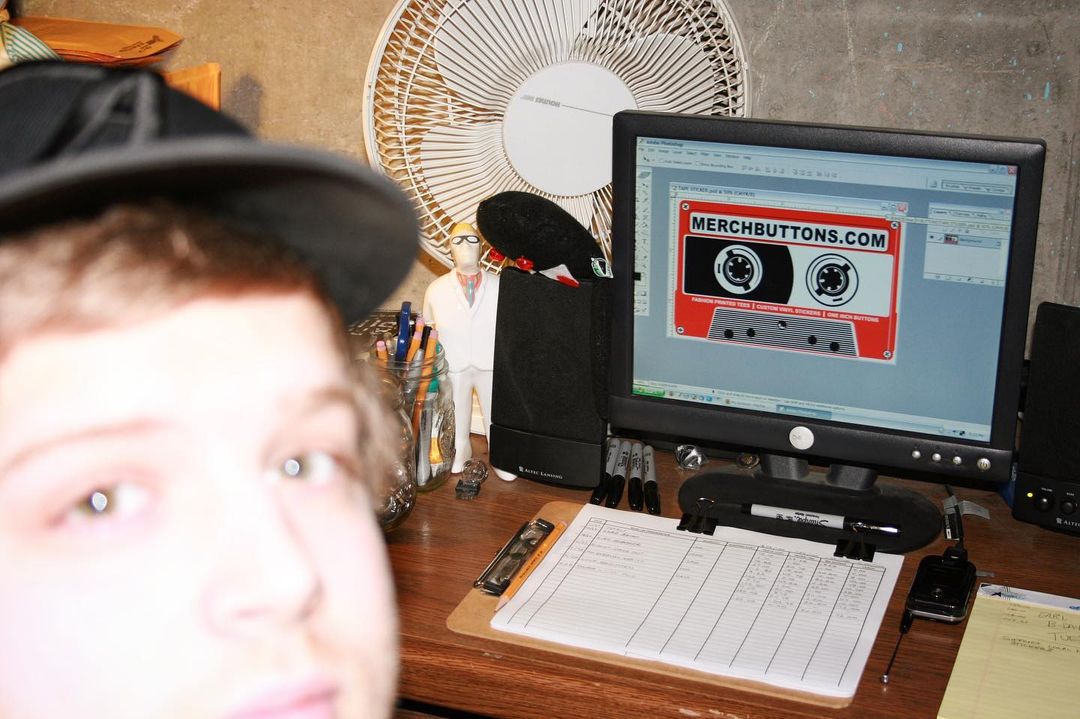
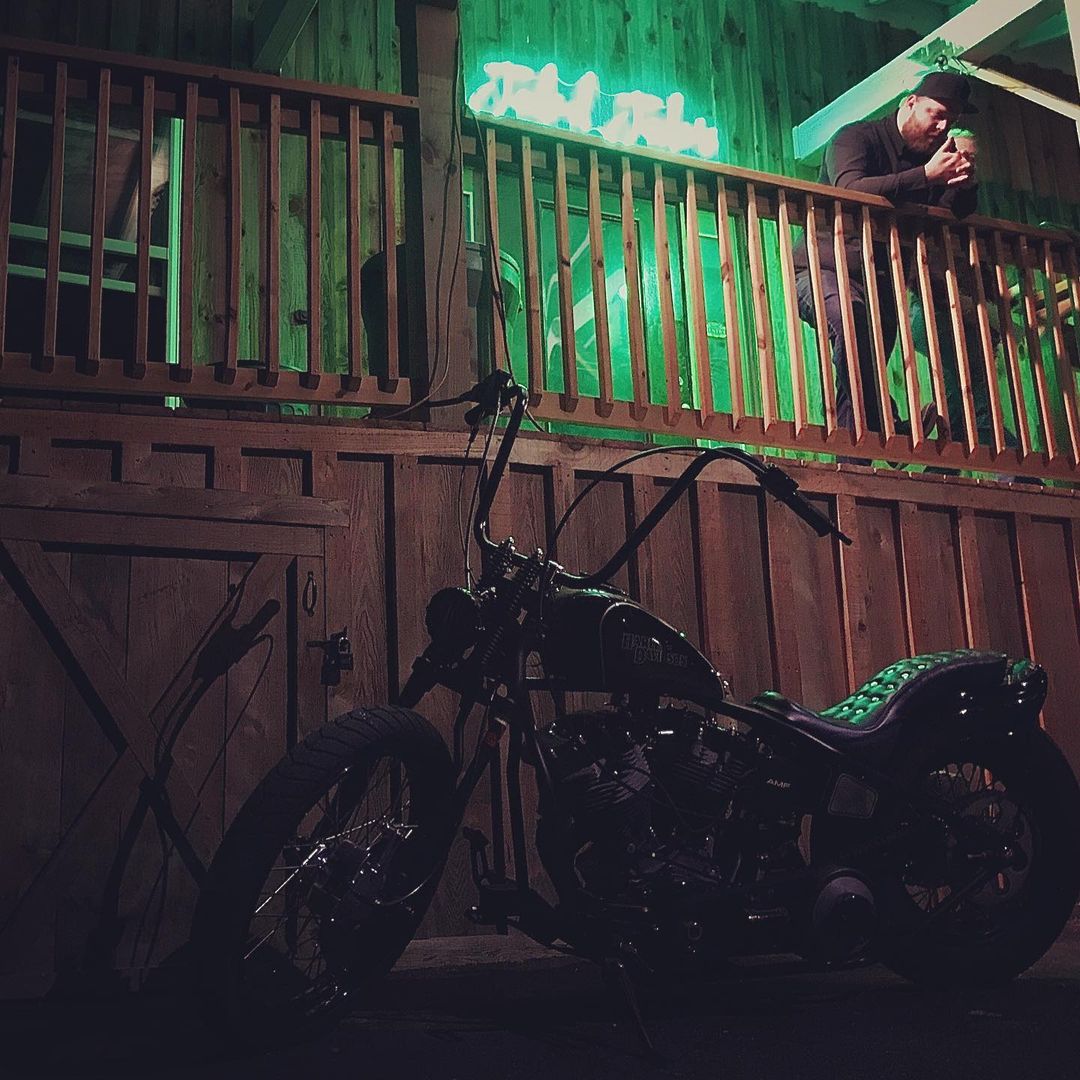
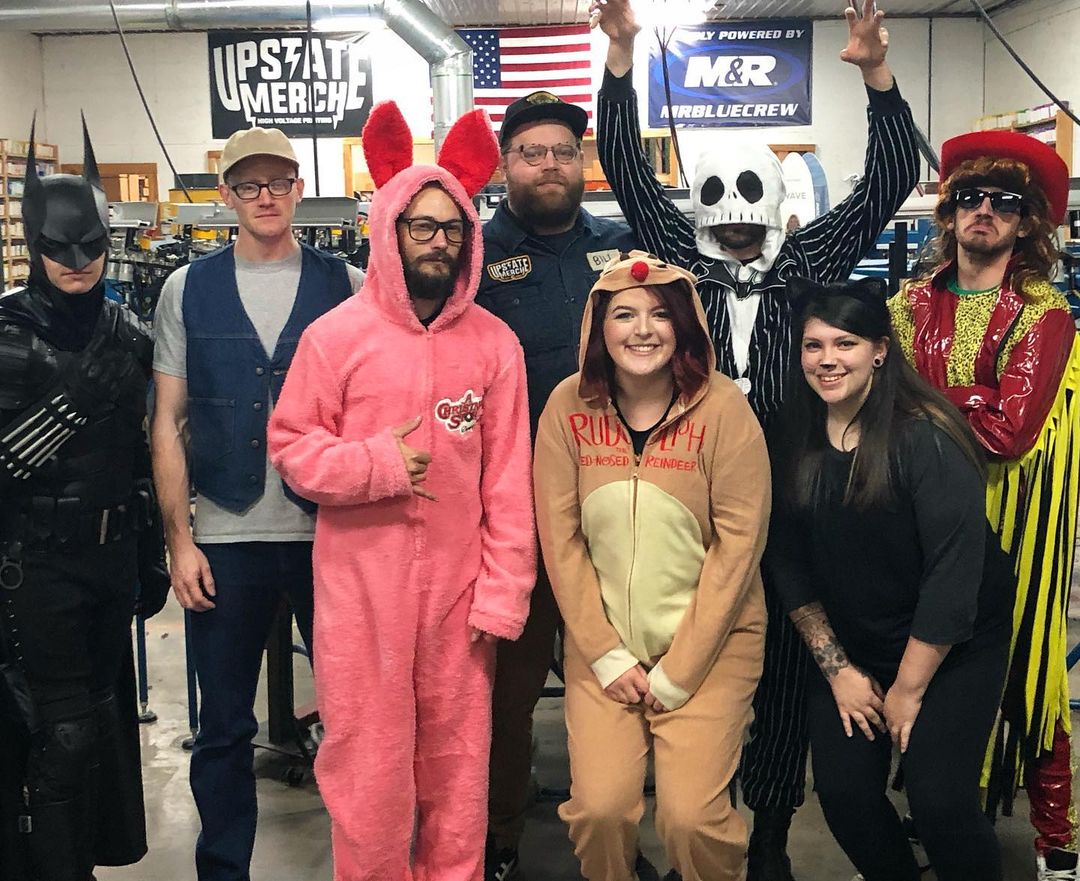
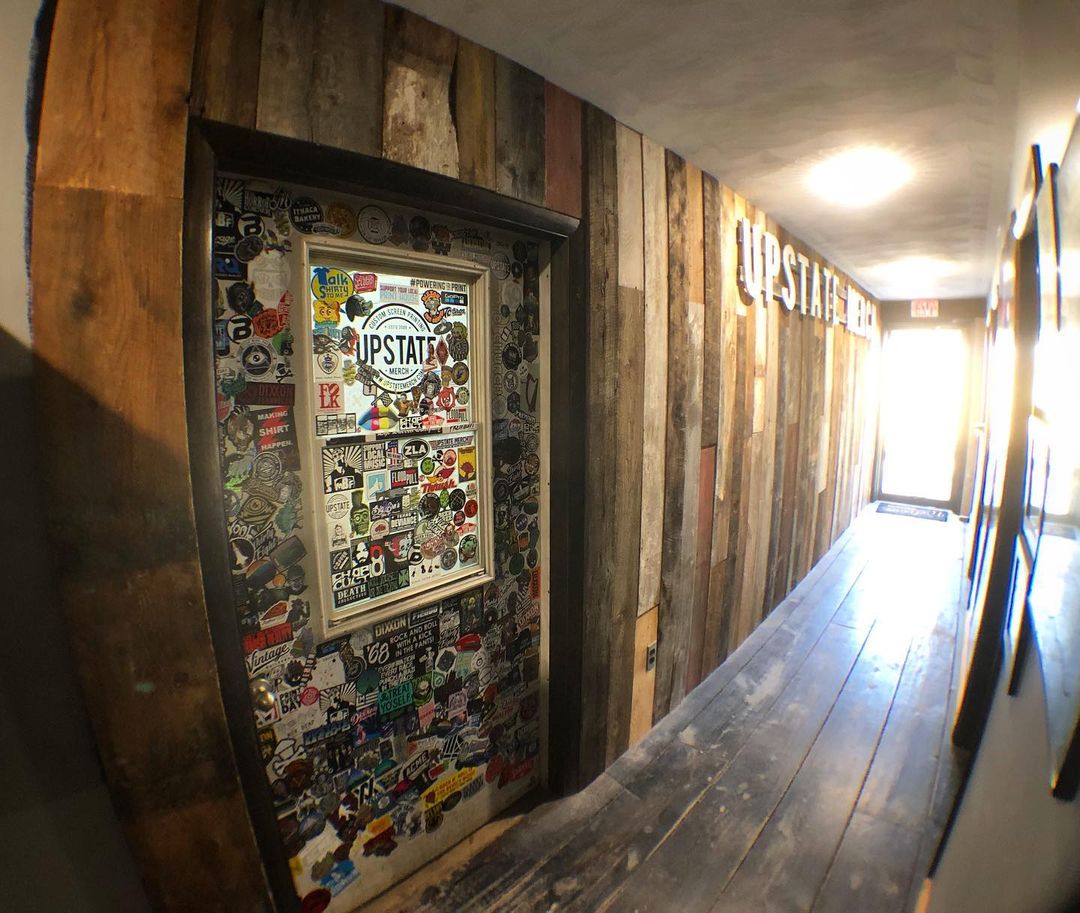
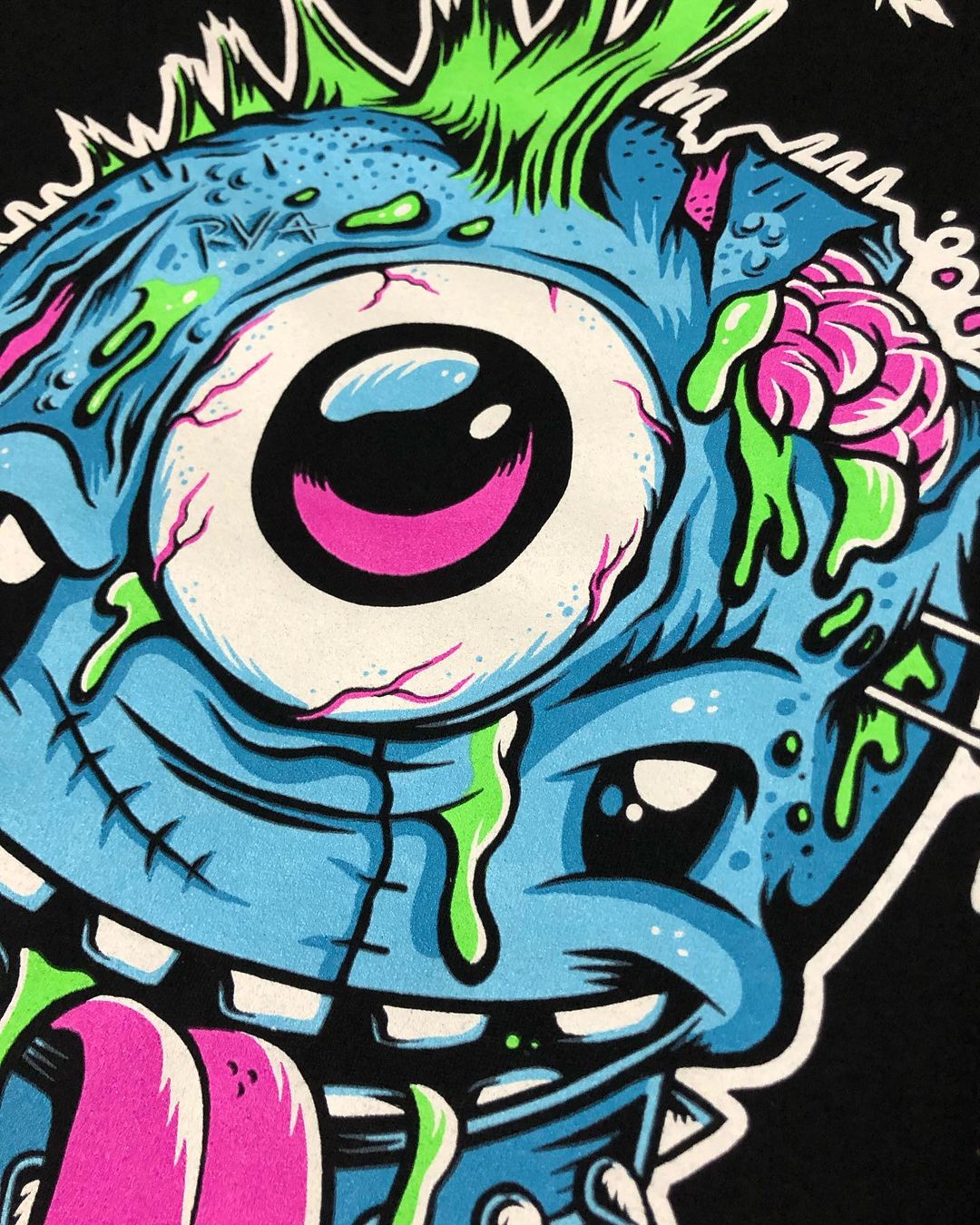
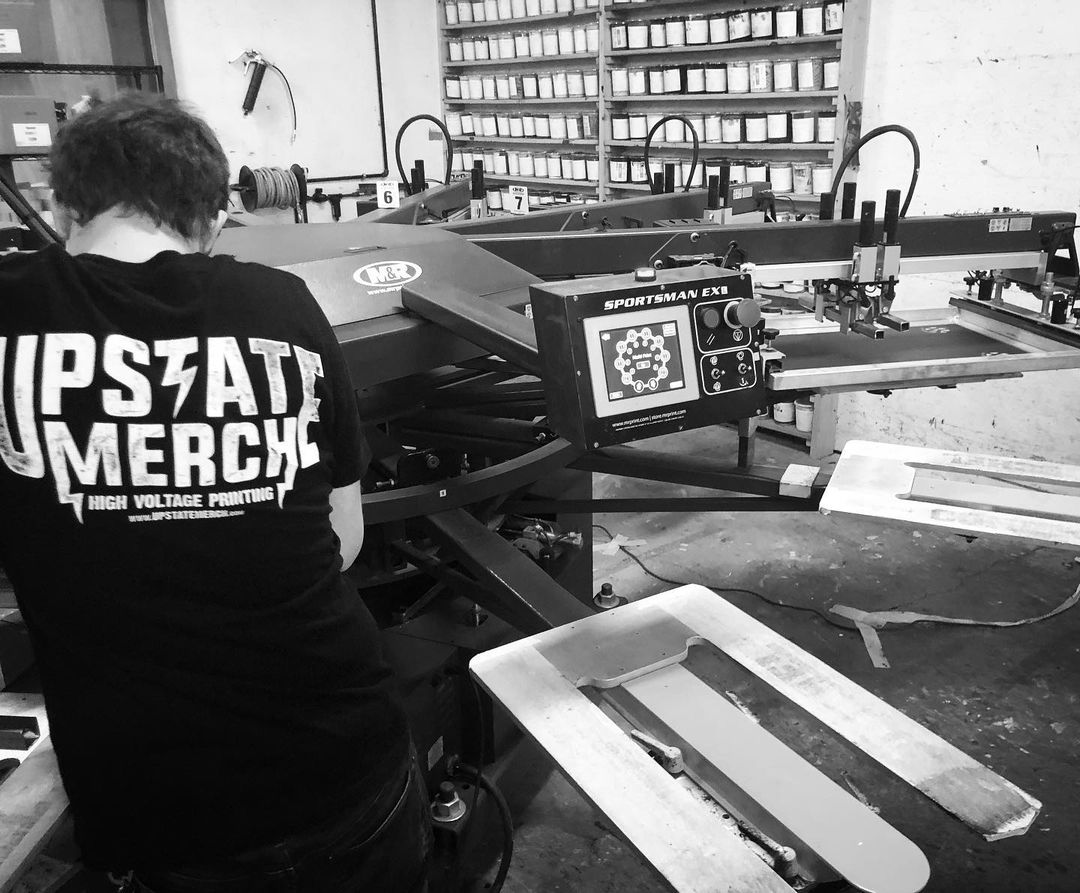

0 Comments